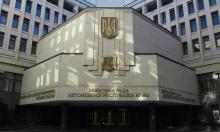Palestine and Israel display scepticism about peace summit
A suicide bomber killed Ron Kehrmann's daughter. Israeli troops murdered Mohammed Naji's son. The two fathers share something else, besides their sorrow. They both don't believe that upcoming summit in Annapolis, Maryland will do anything to end conflicts between the two countries.

"I think it's all a big waste of time," Kehrmann said, citing the weakness of leaders on both sides.
"This is not the first conference to be held," Naji said. "None of these conferences produced peace."
Polls show that most Israelis and Palestinians have little hope ahead of the gathering the first formal attempt to launch peace talks in seven years. More than 4,400 Palestinians and 1,100 Israelis have been killed in the Israeli-Palestinian fighting that followed the breakdown of talks.
Naji and Kehrmann lost their children in vastly different circumstances and the deaths cannot be equated.
Naji's son, Abdel Moneim, was a militant who was targeted by an Israeli undercover unit in 2004. Kehrmann's daughter Tal was a 17-year-old girl killed four years ago while riding a bus on her way to shop for her high school graduation.
Naji has seven other sons serving time in Israeli prisons for their involvement in deadly attacks and he has little hope of seeing them again.
Israel, hoping to improve the pre-summit atmosphere, has pledged to release this week about 450 of the more than 9,000 Palestinian prisoners it is holding. Keeping with long-standing Israeli policy, none of those slated for release is serving time for deadly attacks on Israelis.
"Israel releases only prisoners who were not involved in killing," Naji said. "That means my sons are excluded."
For Kehrmann, the release of Palestinian prisoners as a goodwill gesture touches the rawest nerve of all. He said the militants set for release are "potential killers."
Kehrmann said he doesn't trust the Palestinians' intentions and that it is a mistake to talk peace before the Palestinian leadership reins in militants and changes its mentality.
"We've been killing each other here for 60 years. Let's give it a year or two of not killing and not talking and then we'll see," he said. "I don't see any positive result that could come out" of Annapolis.
In a poll released this week, 57 percent of Palestinians said they don't believe the conference will lead to progress in peacemaking. The poll, conducted by the independent Near East Consulting firm, surveyed 1,200 people and had a 3 percentage point margin of error.
A similar Israeli poll, conducted two weeks ago by the Dahaf polling institute, found that 66 percent of Israeli Jews believed Annapolis would fail. The poll surveyed 500 people and had a 4.5 percentage point margin of error.
"I am full of hope that something will come out of it, but I don't believe it. Experience has taught us that nothing comes from these gatherings," said 52-year-old Israeli Yehuda Cohen, a green grocer.
Olmert received a boost earlier this week when a group of prominent Israeli intellectuals and former army officers pledged their support for his peace efforts. But the feeling does not appear to be trickling down to the street.
"The conflict is too deep to solve in words. We need deeds," said Daniel Nevo, 24, from Jerusalem. "I don't think that the conflict can be solved in my lifetime."
The Palestinian poll indicated a slight increase in optimism. But many remain skeptical.
"I think they will not succeed," said Nidal Khalaf, a 38-year-old restaurant operator in the West Bank city of Nablus. "If they do I will make a huge party in my restaurant to celebrate, but it seems unlikely."
Complicating matters is the Hamas militant group's takeover of the Gaza Strip in June. Israel's negotiating partner, Palestinian President Mahmoud Abbas, who is in a bitter power struggle with Hamas, rules from the West Bank and has little influence over Gaza.
With Abbas unable to halt Gaza militants firing crude Qassam rockets into Israel almost daily, many Israelis question the point of peace talks. Israel has responded to the Hamas takeover by closing Gaza's borders, allowing in only basic humanitarian supplies and food.
Fayez Ali, 38, a Gaza businessman, said he prayed the conference would ease the stifling closure of Gaza that has devastated his clothing business.
"I am full of hope that the conference will change our life," he said. "We live in a hell now and we want to get out from this hell to live again as humans, to have a good economy and to have a good future."
Shaaban Abdel Radi, 44, a Gaza farmer, said he doubts the current leadership could bring about a compromise, but said it was worth a try.
"The conference will bring nothing, but it will revive the hope in our hearts," he said. "Hope is all we have."
Subscribe to Pravda.Ru Telegram channel, Facebook, RSS!




